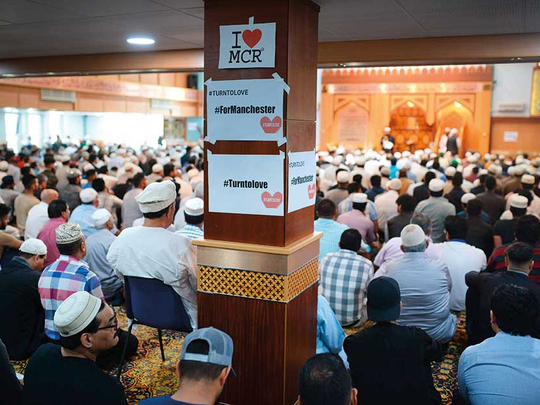
MANCHESTER, United Kingdom: Britain’s government came under fire for cutting police budgets as election campaigning resumed Friday and investigators scrambled to bust a Libya-linked jihadist network thought to be behind the Manchester terror attack.
Opposition Labour leader Jeremy Corbyn said it was the “responsibility” of governments to minimise the risk of terror by giving police the funding they need after cuts made while Conservative Prime Minister Theresa May served as interior minister.
May and Corbyn had suspended campaigning for a snap June 8 election after Monday’s suicide bombing at a Manchester pop concert, which killed 22 people, including children and teenagers, and wounded dozens more.
Eight suspects are currently in detention on UK soil in connection with the blast, for which the Daesh group has claimed responsibility, while police in Libya have detained the father and brother of 22-year-old suicide bomber Salman Abedi.
Police said the eight men ranged in age from 18 to 38, including a 30-year-old arrested in the Moss Side area of Manchester in the early hours of Friday.
Washington’s top diplomat Rex Tillerson also visited London on Friday in an expression of solidarity after Britain reacted furiously to leaks of sensitive details about the investigation to US media.
“We take full responsibility for that and obviously regret that that happened,” Tillerson told reporters.
Britain briefly suspended intelligence-sharing with the United States on Thursday over the leaks.
“In terms of fixing the relationship between the United States and Great Britain, this special relationship that exists between our two countries will certainly withstand this particular unfortunate event,” Tillerson said.
US President Donald Trump has threatened to prosecute those responsible for the “deeply troubling” security breach, which has strained the close relationship between Washington and London.
Monday’s bombing at a concert by teen pop idol Ariana Grande was the latest in a series of Daesh-claimed attacks in Europe that have coincided with an offensive on the jihadist group in Syria and Iraq by US, British and other Western forces.
Britain’s terror threat assessment has been hiked to “critical”, the highest level, meaning an attack is considered imminent.
Troops have also been sent to guard sensitive sites, an unusual sight in mainland Britain, while armed police are now patrolling the country’s trains for the first time.
The issue of security, which was not widely discussed in the general election campaign before the attack, is now expected to feature highly.
A YouGov poll published in Friday’s edition of The Times put the Conservatives on 43 percent compared to Labour on 38 percent, far better for Labour than the double-digit margin that had previously separated it from the ruling party.
However, the poll also suggested that 41 percent of respondents believe the Conservatives would handle defence and security best, compared to 18 percent who said the same of Labour.
YouGov polled 2,052 people on Wednesday and Thursday.
At the launch of the UK Independence Party’s manifesto on Thursday, deputy leader Suzanne Evans said May “must bear some responsibility” for the terror attack in Manchester this week due to policing budget cuts.
The number of police officers fell by 14 per cent, or almost 20,000, between 2009 and 2016, according to the independent Institute for Fiscal Studies think tank.
The Conservatives have been in power since 2010, but Home Secretary Amber Rudd on Thursday said cuts could not be blamed for Monday’s attack.
“I have asked the head of counter-terrorism whether this is about resources. It is not,” she said.
At the G7 summit in Sicily on Friday, May will emphasise the importance of tackling the spread of terror online by urging internet companies to do more to remove extremist content.
Manchester-born Abedi, a university dropout, grew up in a Libyan family that reportedly fled to the northwestern English city to escape the now-fallen regime of Libyan dictator Muammar Gadaffi.
Libyan officials said he and his brother Hashem belonged to the Daesh group, while their father Ramadan once belonged to a now-disbanded militant group with alleged ties to Al Qaida.
Libya said it was working closely with Britain to identify possible “terrorist networks” involved, while a British official said that Abedi had been on the intelligence radar before the massacre.
On Friday evening, a defiant Manchester is set to go ahead with hosting an athletics contest, the Great City Games, in which the likes of former world 100 metres champion Kim Collins are due to compete amid robust security.
Following a minute’s silence in the city’s St Ann’s Square on Thursday, crowds broke into a spontaneous rendition of “Don’t Look Back in Anger” by the city’s own Britpop band Oasis.
Some 75 people were still being treated in hospital, including 23 in critical condition, medical officials said.
Twelve of those injured were under 16, and the youngest killed was an eight-year-old girl.
— AFP












